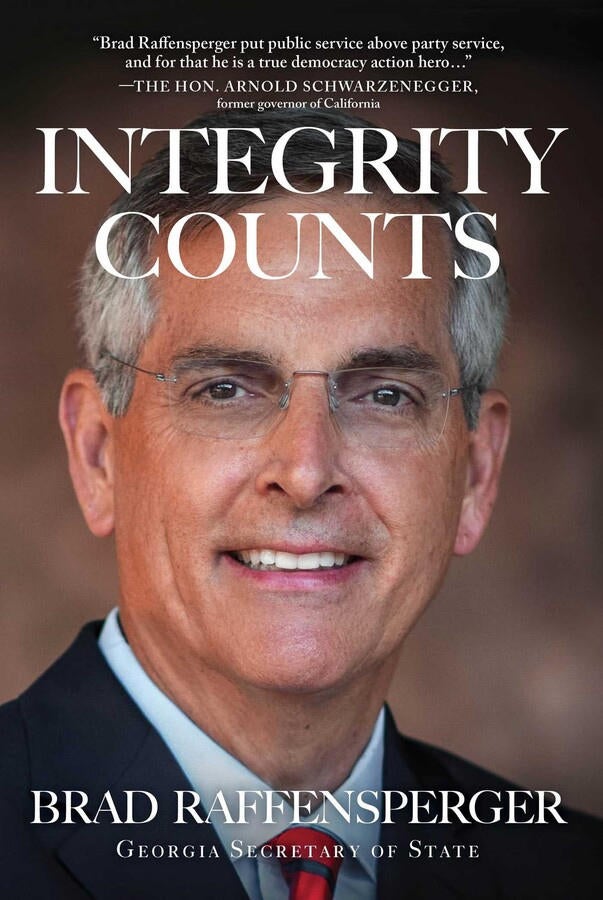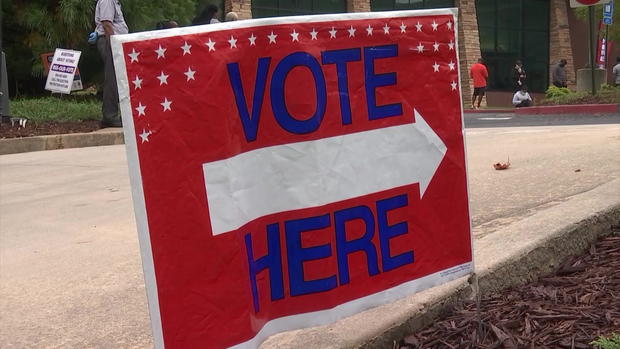One year ago today, on January 2, 2021, President Donald Trump set in motion his most brazen effort to overturn his election defeat. In a recorded phone call, he told Georgia's Republican Secretary of State Brad Raffensperger, "I just want to find 11,780 votes, which is one more than we have." Mr. Trump also told Raffensperger he could face unspecified criminal charges if he did not bend. "That's a criminal offense … That's a big risk to you," Mr. Trump warned. "I listened," Raffensperger told CBS News chief Washington correspondent Major Garrett. "But I also knew that, 'You can dig all you want, Mr. President. We have the facts, and I'm sorry, you lost.'" Garrett asked, "Did it shock you?" "I was going to make sure that we followed the law and we followed the constitution, and I wasn't going to be swayed, pushed, or deviating from that." Raffensperger recounts that call, and the turbulent months after the 2020 election, in his new book, "Integrity Counts" (distributed by a division of ViacomCBS). Raffensperger was dogged by accusations that he helped steal the election from Mr. Trump. He faced death threats; his wife was threatened with sexual violence. Raffensberger, a lifelong Republican and conservative who voted for Mr. Trump, felt hunted – by fellow Republicans. Garrett asked, "What's that been like?" "You watch yourself," Raffensperger replied. "You watch your back. And you need to start looking for people's tells." Meaning? "Is there anything on the side of their hip? Things like that." Raffensperger also got a dog. "Is it a guard dog?" Garrett asked. "No. But he's an awareness dog," he smiled. Baseless allegations of fraud in Georgia and other states — amplified by Mr. Trump ("This election was stolen, from you, from me, and from the country") — fueled the violent Capitol siege on January 6. Raffensperger said, "They were misled, they were deceived, they were given falsehoods about the results of the election." Those falsehoods were on display in full color in Maricopa County, Arizona, where the GOP-controlled State Senate sponsored a so-called "election audit" last May. It concluded Mr. Biden actually won with more votes than originally indicated. A summer symposium on 2020 election fraud, conducted by the CEO of My Pillow, Mike Lindell, yielded no evidence. Even so, 2021 saw 19 states, most led by Republicans, tighten election laws, according to the Brennan Center for Justice. One irony of all this: the conservative-leaning Heritage Foundation found four of the states President Trump most vociferously contested had some of the nation's most secure voting procedures. Helen Butler is a proud Democrat who served on the Board of Elections in Trump-friendly Morgan County, Georgia, for more than a decade. Republican county leaders there recently enacted new rules, allowing them to purge board members, including Butler. She told Garrett, "If you re-constitute the board with a lot of members that are made up of one political party and the political line of that party is that you have to change the outcome of the election to keep someone in power, this is a way to do it." Meaning, as the old saying goes, it doesn't matter as much who votes; it matters more who counts. Butler said, "I see it as, 'We didn't get it done this time, but next time I'm gonna get it done because I have total control of the election process.'" Threats of violence still stalk Americans who did nothing more than count ballots. One of them is Tom Freitag, director of elections in Bucks County, Pennsylvania. He told Garrett he's received "a lot of angry calls, emails, threats." "What kind of things are we talking about?" "We received one email that said that we would all hang for treason." Bucks County is a swing county in a swing state. Mr. Trump won Pennsylvania by 44,000 votes in 2016; he lost by nearly twice that many in 2020. Garrett first met Frietag in September of 2020 when he was working around the clock to build a vote counting facility from scratch, all to comply with a staggering new demand for voting by mail, set in motion by a new state law, intensified by pandemic safety concerns. They were installing high-speed scanners to scan the ballots quickly. "We have ten of them," he said. When asked today how the counting process played out, Frietag said, "We were all nervous going into it. Overall, I think it went really smoothly with the hand we were dealt." And yet, the threats and bullying continued for a full year. "Are you frustrated so much that you might quit?" Garrett asked. "There's been days I wonder why I'm still doing this," Frietag replied. "I don't think I've gotten to the point where I want to quit just yet, but there's been days where I don't really want to come into work." Bob Harvie, an elected county commissioner in Bucks County, said, "This is not something I've seen except going back to the Civil War. And it does scare me." We asked Harvie about January 6: "If you wanted to destroy democracy, the first thing you do is turn members of that country against each other," he said. "And the second thing you do is to get people to start doubting the validity of the elections." Doubts – they circulate the country as a contagion of conspiracies. Wisconsin, long a hotbed of hard-fought and very close elections, is in the throes of a secretive Republican-led investigation into voter fraud in 2020. State Senator Kathy Bernier, a former election administrator herself, is a loud Trump supporter and among the most conservative voices in the legislature. Yet, she said, "I am a Republican. [but] we can't continue to beat a dead horse. We need to move on. The man leading the effort to find it, Republican State Assembly Speaker Robin Vos, declined "CBS Sunday Morning"'s interview request for this story. For some pro-Trump Republicans, contesting or denying the result is no different than Democrats refusing to accept Mr. Trump's election – no less harmful, they would say, than persistent allegations of Russian collusion. Bernier accepts Mr. Biden as president, but adds, "The Democrats are just as guilty as the Republicans for perpetuating misinformation or outright lies." Secretary of State Raffensperger, in general, agrees: "These stolen election claims, what they do is they undermine voters' confidence in the election process." He's more focused now on his next election, a GOP referendum of sorts on election denialism. His opponent, Congressman Jody Hice, objected to certifying Georgia's election results. Garrett asked Raffensperger, "How do you feel about this coming up, the primary?" "Well, see, I can stand on the truth," Raffensperger. "What's he going to stand on? Hice declined our repeated requests to speak with him. Raffensperger said, "I think at some point people have to face the brutal truth of what the election results were." "Do you feel ever that on this particular topic, you are howling into the wind?" "Like a voice in the wilderness? Yeah."
"Were there voter fraud cases? Yes, there were. And they're being investigated now. But there was not organized, widespread voter fraud in the state of Wisconsin that anyone has provided proof of."
For more info:
Story produced by Arden Farhi. Editor: Ed Givnish.
Tags:
News


